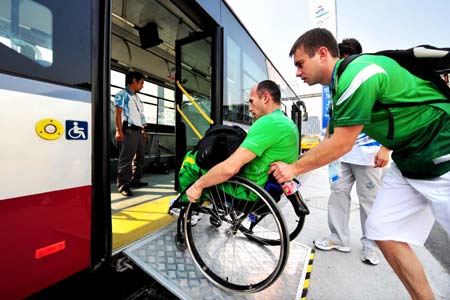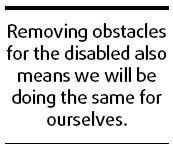In a way, the Beijing Paralympics, which opens tonight, should be an event more significant to the Chinese people than the Olympic Games.
 A Paralympic athlete rolls his wheelchair up a ramp with the help of a team staff member to get onto a bus in this picture taken on September 3, 2008. [Xinhua]
A Paralympic athlete rolls his wheelchair up a ramp with the help of a team staff member to get onto a bus in this picture taken on September 3, 2008. [Xinhua] |
If the hosting of the Olympics was for China to fulfill a 100-year-old dream, and to a certain extent, show its achievements and strengths, the Paralympics is an opportunity for Beijing and the country as a whole to learn.
The Paralympics is not simply a platform to gold medals but an arena to demonstrate how determination of the human spirit can enable people to conquer their fate.
However, as host of the Paralympics there is much more that should spur us on.
For one thing, we must learn how to facilitate the mobility of people with disabilities so that it is easier for them to get about.
Yes, we do have more ramps for wheelchairs and special sidewalk paths for the blind in Beijing. For the Paralympics we have got dozens of new taxis equipped to accommodate the disabled.
Yet can we say Beijing is really friendly to disabled people? I doubt it. One obvious defect is the fact that none of the subways, a major means of transportation in the city, are accessible to people in wheelchairs.
Just look around, you rarely see a person with a disability, although statistics show that there are more than one million disabled people in Beijing. That means one in 15 citizens. Yet on the streets you hardly see any such person. This fact indicates the lack of facilities to make them more mobile.
The Paralympics is an opportunity for Beijing to provide these people with more facilities. But what about other cities in the country? And future urban planning?
We must learn to be more considerate, and take the needs of disabled people into account when planning buildings, streets, and other infrastructure.

Actually many disabled people are more capable than we imagine and can be very independent too as long as they are allowed more mobility. Yet designers of many of our structures seem oblivious to this fact.
Even buildings that have ramps, the slopes are too steep and the turns too sharp, it is difficult to maneuver a wheelchair.
It is good that some organizations have launched activities for people to experience life with a disability. It may help us to be more conscious of the needs of these people. And it will be even better if the disabled are consulted before structures are designed and built in the future.
Why is it so important to facilitate the free mobility and independence of disabled people? That is the third thing we must learn in hosting the Paralympics. We must respect them as human beings as we would the able-bodied.
Many assume that disabled people should be the target of sympathy and care. Yet they do not know sympathy is often seen as pity, something disabled people resent. It is often seen as a condescending attitude.
The disabled are indeed facing greater difficulties in life than many of us can imagine. Yet many of them face up to these difficulties with courage and fortitude and get on with lives.
Nevertheless, in most cases their biggest obstacle is the lack of proper facilities.
If we fail to act, all our sympathy and care will amount to nothing - we will just be reminding them of their disability and inequality.
I know many people with disabilities are very capable and intelligent. I often seek their help rather than the other way round. For instance, my computer was assembled and has been maintained by a young man partially paralyzed due to a fall. I am full of admiration for him.
Finally, we should learn from the Paralympics that all of us are only temporarily able-bodied. Our physical strength fails us when we get old. We see many senior citizens become wheelchair-bound.
Removing obstacles for the disabled also means we will be doing the same for ourselves.
The author is a council member of China Society for Human Rights Studies